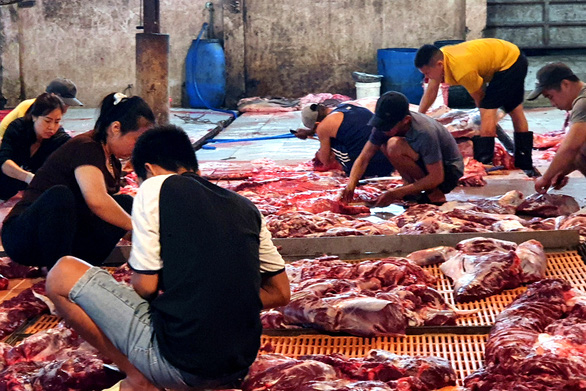Ho Chi Minh City has applied traceability measures to control the origin of pork, poultry, eggs, and other agricultural products since 2017. However, the origin tracing program fails to set consumers’ minds at rest.
Most consumers think that the program is not effective, so unsafe food remains in the market.
Consumers pay little attention to origin traceability
At a supermarket on Chu Van An Street in Binh Thanh District, Tuoi Tre (Youth) newspaper reporters found that consumers pay much attention to the freshness and quality of food products as well as their brands and prices.
They do not check if the products bear origin tracking tags or not.
Ho Thi Thuy, a customer of the supermarket, said she still believes that commodities in supermarkets have clear origins and are clean, and pays little attention to the origin traceability.
“Some vegetable and meat products are labeled with QR codes but elderly people like me find it hard to use smartphones [to scan the codes].”
Similarly, at many other supermarkets and food stores in Ho Chi Minh City, organic products are displayed in a separate area and stuck with QR codes, which allow the tracking of products’ information and origin, and are more expensive than others.
Nevertheless, a few people have confidence in such QR codes.
Nguyen Thi Minh, residing in Binh Thanh District, said QR codes of some vegetable products do not provide the information about the farming and production process of the products, but mainly their providers and distributors.
“Origin tracking labels on products fail to help consumers have necessary information. Therefore, it’s hard to gain consumers’ confidence,” Minh noted.
Regarding pork, Doan Van Thanh in District 12 admitted that origin-traceable pork at wholesale markets helps consumers feel secure.
However, in reality, consumers have no necessary information as pork at traditional wet markets are cut into smaller pieces, so their origin cannot be traced, Thanh said.
He added that even tracking tags with sufficient information cannot ensure that the information is accurate and products are clean and safe.
“We care about the origin of products, but the most required information, which is the production process and the safety of products, is not provided.
“If safe and unsafe products are mixed or the products’ origins can be traced but the products’ quality is poor, it makes no sense,” Thanh said.
Imperfect process
Nguyen Van Thang, deputy director of the Department of Agriculture and Rural Development of southern Dong Nai Province, told Tuoi Tre on Monday that Dong Nai provides a large volume of food, especially pork and chicken, to Ho Chi Minh City.
The province has been striving to promote the origin traceability. Nevertheless, it has faced multiple difficulties, such as a lack of human resources, and local farmers’ disinterest in origin tracing programs due to higher costs.
According to a representative of the provincial rural development agency, Dong Nai supplied more than 942,200 pigs, nearly 11.7 million chickens, over 13,800 cows, and 121,500 tons of vegetables to Ho Chi Minh City last year.
As for Ho Chi Minh City’s program to trace the origin of pork and chicken, the representative said 963 livestock units in Dong Nai have registered to take part in the program with over 6.4 million pigs wearing traceability rings.
In addition, 20 slaughterhouses have got involved in the program with over 800,000 pigs wearing traceability rings per year.
Furthermore, 172 chicken farms and seven slaughterhouses have participated in the program with over 64.6 million and some 21 million chickens, respectively, have their origins traced.
A representative of the Department of Agriculture and Rural Development of Long An Province told Tuoi Tre that the province has traced the origin of products for many years, but the origin tracing program requires officials to have an intimate knowledge of the process and increases traders’ costs.
Therefore, many farmers and traders have got involved in the program in a perfunctory manner.
As a result, the information about the origin of products may be false.
Nguyen Huu Thang, owner of a large pig farm in Vinh Cuu District, Dong Nai, said the origin traceability helps improve the livestock quality.
However, as traders have to pay for traceability rings, at VND6,000 (US$0.24) for two rings for each pig, so they seek lower prices from farmers.
In addition, each farm participating in the origin tracing program is issued a code. However, many traders buy pigs from various farms and declare that the pigs are from the same farm, causing difficulties in tracing their origin.
More information required
Dr. Nguyen Dang Nghia, director of the Research Center for Southern Soils, Fertilizers and Environment, said the origin traceability helps improve the control of food quality.
However, the information about the farming and production process is insufficient.
Moreover, the scale of the origin tracing program is small. Only Ho Chi Minh City has traced the origin of pork at wholesale markets, so it is hard to control the quality and information of food products.
“It is needed to enhance the connection of farmers, traders, and distributors. They should have information about each other and apply the same standards in origin traceability and quality.
“Ho Chi Minh City needs to require products on sale in the market, including at traditional wet markets, to have packaging for easier traceability.”
Like us on Facebook or follow us on Twitter to get the latest news about Vietnam!



















































